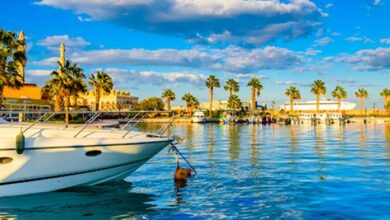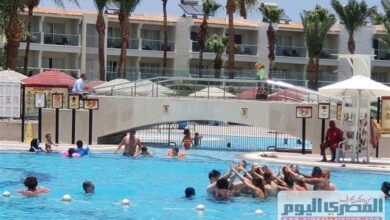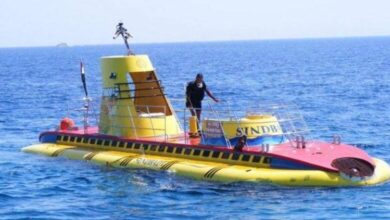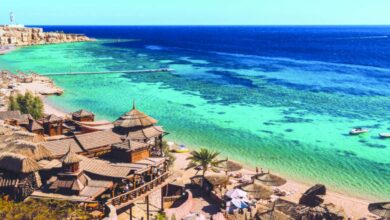
HURGHADA — The speedboat was leaving the fancy new marina of Hurghada at a slow pace. As soon as it exited the port, the vessel’s powerful engine was pushed to four knots, splitting the froth and bouncing on top of small waves, on its way to Magawish Island, located a few kilometers off the coast of Hurghada.
On Friday, 16 November, a massive cleanup was organized there to remove all the trash from the island.
This low-elevation island, sitting atop crystal-clear coral reefs, is quite barren, except for a few bushes grilled by the sun. On each side, gentle creeks cut off by the incessant tide host piles of garbage washed ashore, from miscellaneous plastic items to mooring ropes and lost buoys.
The infamous north-south Red Sea wind carries all the trash disposed of at sea, and garbage from the shore. The island is considered an important nesting ground and stopover for migratory birds, and attracts numerous avid birdwatchers every season.
The Hurghada Environmental Protection Conservation Association (HEPCA) is the NGO in charge of the cleanup campaign. Founded in 1992 by representatives of the local diving community, HEPCA has gained local and international recognition as the country’s most successful and efficient environmental NGO.
Since its inception, HEPCA has had to solve issues pertaining to the preservation of the Red Sea’s ecosystem in the particularly vulnerable context of a rapidly growing destination of mass tourism.
Hurghada, just a decade ago, was a small fishing town. But the beauty of the marine ecosystem attracted investors who built a kilometers-long string of resorts, sometimes right on top of the pristine coral reefs. The coastline itself, as a result of constant dredging, has been changed dramatically.
The massive tourism development led to acute ecosystem stress, which translated into the destruction of coral reefs, broken down by anchors thrown from the boats carrying tourist divers, and an accumulation of plastics, not properly collected, into the sea. Mistaken for jelly fish by sea turtles, the turtles would swallow the plastic bags and choke to death.
The first project HEPCA completed was to set up a large mooring system in the Red Sea, to delimit areas devoid of corals where boats could throw their anchors. Today, the Red Sea mooring system is the largest in the world and other countries in the region have adopted it.
Determined to put an end to the mass sea turtle deaths, HEPCA also took over the garbage collection of the entire city of Hurghada. Amr Ali, executive director of the NGO, said that HEPCA received a LE20 million loan from the Hurghada Chamber of Hotels.
“Most of the money was used to buy equipment — trucks, vans — and the rest covered the workers’ salaries and the cost of the fuel,” he said.
The city produces 550 tons of garbage daily. Since HEPCA started collecting the city’s garbage, they deliver 10 tons of organic waste to local Bedouin tribes to feed their animals.
HEPCA has repeatedly organized cleanup campaigns over the past years but what is different with Magawish is the size of the operation.
“This time, the navy cooperated and put at our disposal a military vessel to carry the heavy machinery in and out of the island,” Ali explained.
Indeed, the old rusty navy vessel discharged on the island’s shore carried two trucks and a small mechanical shovel, used to carry the heavy pile of trash.
Also, for the first time, Environment Minister Mostafa Hussein Kamel arrived to witness the cleanup operation. The governor of the Red Sea, Mohamed Kamel, was also there, and both men were followed by an impressive crowd of men in suits and black sunglasses, painfully treading the uneven soil under the scorching sun.
On each side of the island, groups of volunteers could be seen crouching, picking up plastic debris and throwing them in big blue plastic bags.
Mo’men Mohamed, 16, a student at Hurghada Language School, said he was helping to collect the trash because “the government is not doing anything.”
One of the kids, giggling, rushed back to his fellow volunteers brandishing a bottle of red wine.
“What are we going to do with this?” asked one of the girls, wearing a bird feather in her pony tail.
“We’ll drink it of course!” replied the kid, shaking the water lying at the bottom of the bottle.
The teams of volunteers, composed of students, hotel employees, divers and locals, were meant to collect plastic products, while the heavy load was dealt with by HEPCA’s professional solid waste team. As Ali explained, “Some mooring ropes can weigh up to 120 kilograms, and the professionals will take care of those, just like the heavy wooden planks.”
One van crossed the island back and forth to collect the heavy piles of garbage from the various HEPCA teams.
Mahmoud Awass, driving a small truck, accepted Egypt Independent’s reporter on board and explained that one track had been selected early in the morning. That meant the trucks had to pass every time on the same track, in order to have minimum negative impact on the fragile ecosystem of the island.
After roaming the island, the group of government representatives and their aides were astonished to see, approaching the shore, an inflatable boat carrying a Russian bride and her husband. The sight of a bride on an island deserted apart from the presence of 200 assiduous garbage collectors was quite surreal.
Both the minister and the governor rushed to congratulate the happy newlyweds as the ruffles of her dress caressed the wet sand underneath.
“The government is supporting this initiative by every means,” declared Kamel, as he walked away. “We got the navy to bring a vessel to transport the heavy machinery, and to carry the big load of garbage off the island.”
He added that the coast guard had also “made a big effort to issue permits necessary for the cleanup to proceed.”
When questioned about the value of Magawish, the governor replied that, like all the other islands on the Red Sea, this one needs protection. He then explained that, the week before, he had toured the many islands of the area to make sure there was no oil spill.
“I realized how special these islands were,” he said. “Of course, I cannot tour the islands every month.
“Also, we have the biggest mooring system in the world,” he added, referring to HEPCA’s work.
When asked why the collection of garbage in Hurghada is handled by an NGO instead of the government, the governor replied: “I don’t need to tell you this.”
When this reporter ventured to voice the word “corruption” as an answer to the official’s comment, he exploded.
“I did not say corruption! Don’t put this word in my mouth!” he said, before walking off, mumbling an insult in Arabic.
Ali’s explanation of what the previous garbage collection system looked like was much clearer.
“The collecting operations were operated by a private, profit-driven society, with little to no accountability,” he said.
He said it was very positive that the NGO had taken over the cleanup operations, as HEPCA works for the community and does not profit from the activity.
“With this system, you have maximum accountability,” he said, explaining that if the community disagrees with HEPCA’s way of doing things, “they can remove us, plain and simple.”
Ali said that although the government is happy that HEPCA has taken over the waste collection, it is not showing enough support, as it does not enforce existing laws against blatant violators.
“For example, if you close down a shop because the owner has thrown garbage in the street, you can be sure that the next day, 60 shops will throw their trash in appropriate places,” said Ali.
HEPCA’s ambition seems to be without limits. In February, it plans to start operating the NGO’s own recycling plant, which will convert waste into energy. Also, a few months from now, HEPCA plans to inaugurate a brand new science lab in the southern part of the governorate, where it will conduct scientific studies with local and foreign scientists.
One of the flagship projects concerns the breeding of sea cucumbers in the lab — 500,000 every year — before releasing them in the sea. They were over-harvested in the past for Chinese consumers, who consider the sea animal a powerful aphrodisiac.
“Believe it or not, sea cucumbers play a major filtering role and balance the marine’s ecosystem,” explained Ali.
This piece was originally published in Egypt Independent's weekly print edition.




